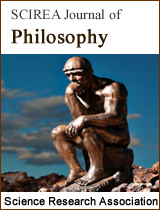On Marcuse's Study of the Negative Erotic Subject -- the Suppressed Subject in the Positive Culture
DOI: 10.54647/philosophy720106 26 Downloads 11558 Views
Author(s)
Abstract
In the real society where qualitative culture prevails, people's psychological level is gradually losing their demand for freedom and liberation after being controlled. It seems to be a Utopia to expect some top-down political or economic liberation. In this regard, Marcuse shifted the starting point of liberation from the state and society to the individual. He wanted to launch a bottom-up sexual liberation movement to find the hope of individual liberation from human psychological instinct. The core of the theory of Eros liberation is the liberation of the subject of Eros, that is, the liberation of human beings through the liberation of eros as human instinct, and then the liberation of the whole society from bottom to top. Marcuse reconstructed his subject philosophy in the theory of sexual liberation. He constructed a radical theory of sexual subject based on the sexual instinct in Freud's instinct theory. Marcuse's construction of the erotic subject is neither a romantic Utopian movement nor an irrational Nuss spirit against the western traditional logocentrism. The core attribute of the erotic subject is a negative spirit, which is the inheritance of Hegel's negative thought to a certain extent. Even the whole structure of the erotic subject can be seen as Marcuse's negation of technical rationality and the recovery of critical rationality in order to resist the positive culture of the dominant reality. Thus, we can connect the break between Hegel's rationalism and Freud's irrationalism in Marcuse's ideological career. In short, his theory of erotic subject has both theoretical and practical significance. It not only provides rich theoretical resources for human liberation theory, but also provides a new research perspective for the liberation of alienated and suppressed people in modern society.
Keywords
marcuse;eros;subject;negativity
Cite this paper
Weikang Zhu,
On Marcuse's Study of the Negative Erotic Subject -- the Suppressed Subject in the Positive Culture
, SCIREA Journal of Philosophy.
Volume 4, Issue 5, October 2024 | PP. 122-131.
10.54647/philosophy720106
References
| [ 1 ] | Marcuse Eros and civilization [m] Huang Yong, Xue Ming Shanghai: Shanghai Translation Publishing House, 2012:1 |
| [ 2 ] | Fromm E. The Human Implications of Instinctualistic “Radicalism” [J]. Dissent, 1955, Fall: 342-349 |
| [ 3 ] | Fromm E. A Counter-Rebuttal [J]. Dissent, 1956, Fall: 81-83 |
| [ 4 ] | Cho D. Thanatos and Civilization: Lacan, Marcuse, and the death drive[J]. Policy Futures in Education, 2006, 4(1): 18-30 |
| [ 5 ] | Stirk P M R. Eros and Civilization revisited[J]. History of the Human Sciences, 1999, 12(1): 73-90 |
| [ 6 ] | Kellner D. Marcuse and the quest for radical subjectivity[J]. Social thought & research, 1999: 1-24 |
| [ 7 ] | Robert G. Plastic eschatology: On the foundations of Marcuse’s philosophical anthropology[J]. Philosophy & Social Criticism,2022,48(8): 1140-1173 |
| [ 8 ] | Holland N J. Looking Backwards: A Feminist Revisits Herbert Marcuse's Eros and Civilization[J]. Hypatia, 2011, 26(1): 65-78 |
| [ 9 ] | Kellner D. Herbert Marcuse and the Crisis of Marxism[M]. Palgrave, London:1984. |
| [ 10 ] | Liuxingzhang Eros liberation and perceptual Liberation -- a comparison of Marcuse's and Marx's theories on human liberation [j] Journal of Jishou University (SOCIAL SCIENCE EDITION), 2009,30 (05): 21-27+42 |
| [ 11 ] | Yanmengwei Fighting for lust is fighting for politics -- on the psychological perspective of Marcuse's political criticism [j] New horizon, 2007 (02): 80-82 |
| [ 12 ] | Zhangzhicang On Marcuse's Liberation aesthetics [j] Marxism and reality, 2007 (05): 34-40 |
| [ 13 ] | Zhouguiqin The possibility and impossibility of artistic Redemption -- an analysis of Marcuse's Thoughts on human emancipation [j] Academic exchange, 2015 (04): 42-47 |
| [ 14 ] | Marcuse H. Negations: Essays in critical theory[M]. London: MayFlyBooks, 2009 |

